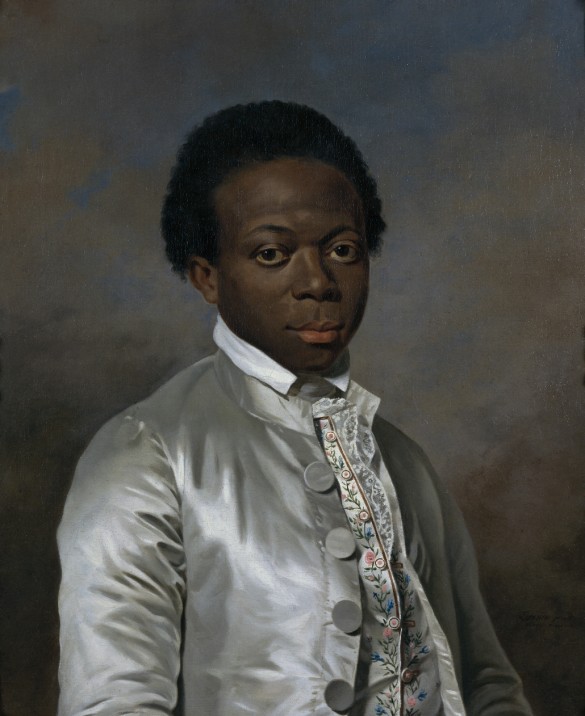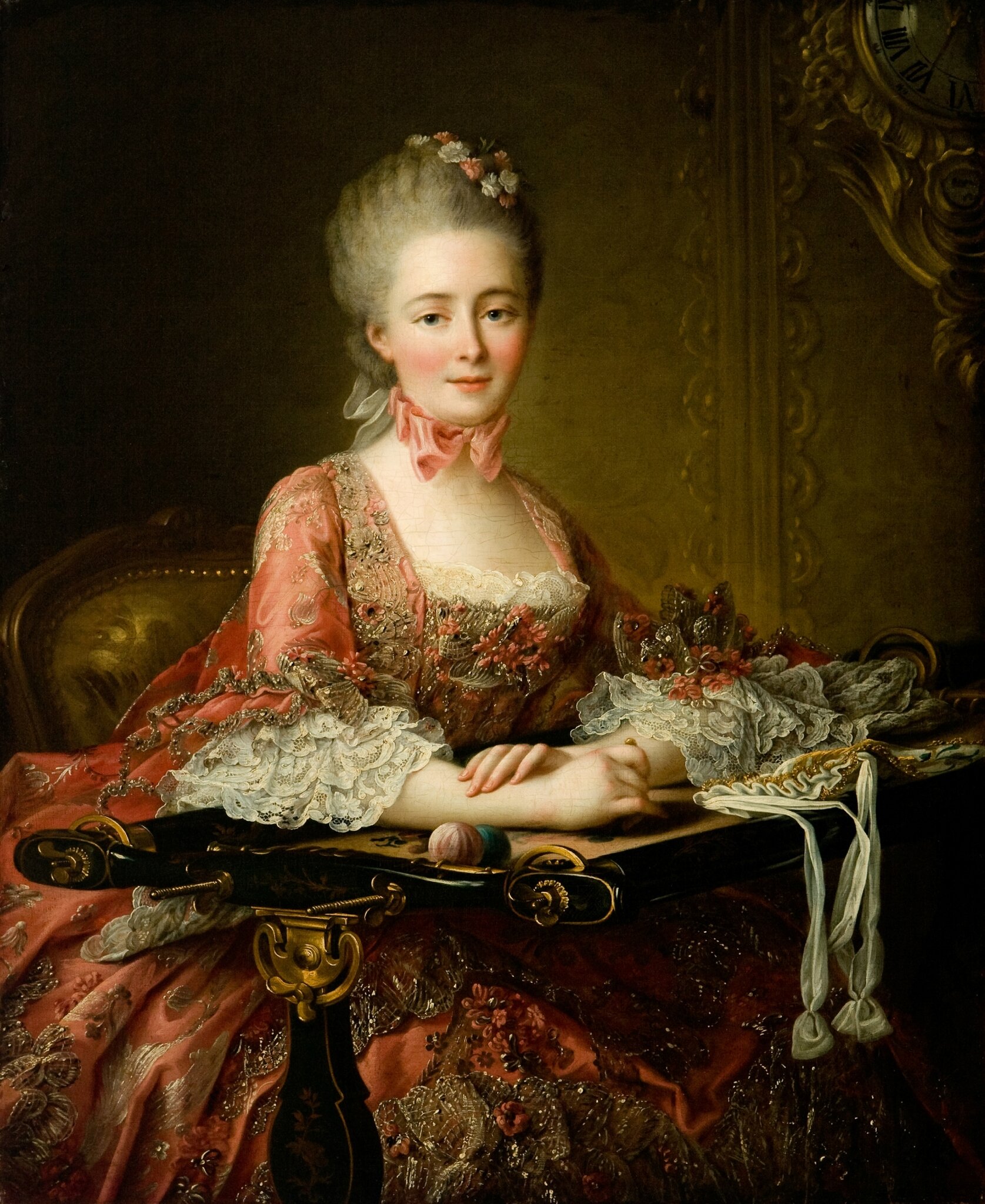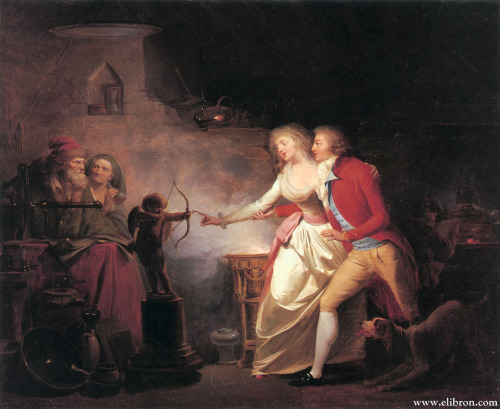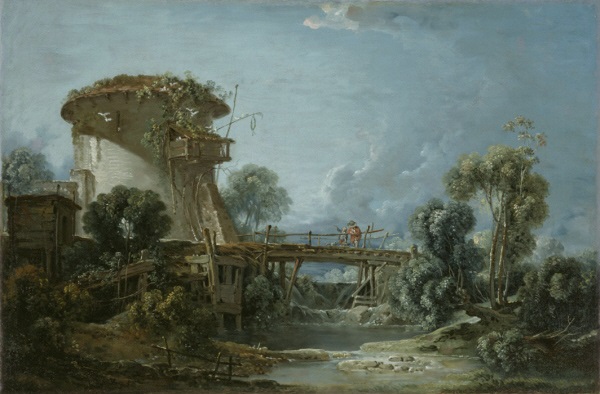National Gallery of Art, Washington,
May 21 through August 20, 2017
When Joseph Bonaparte, elder brother of Napoleon I, fled to America in 1815, he packed his collection of 18th-century French painting. In an effort to spread his native country's culture across the United States, he put his works on public display, causing a sensation and inspiring a new American fascination with French art. From then on, such works made their way into museums and private collections from coast to coast. America Collects Eighteenth-Century French Painting, on view in the West Building of the National Gallery of Art, Washington, from May 21 through August 20, 2017, is the first survey of American taste for French painting of the period. Presenting 68 of the finest examples found in American museums today, the exhibition tells the story of the collectors, curators, museum directors, and dealers responsible for bringing the paintings across the Atlantic and into the collections they now call home.
May 21 through August 20, 2017
When Joseph Bonaparte, elder brother of Napoleon I, fled to America in 1815, he packed his collection of 18th-century French painting. In an effort to spread his native country's culture across the United States, he put his works on public display, causing a sensation and inspiring a new American fascination with French art. From then on, such works made their way into museums and private collections from coast to coast. America Collects Eighteenth-Century French Painting, on view in the West Building of the National Gallery of Art, Washington, from May 21 through August 20, 2017, is the first survey of American taste for French painting of the period. Presenting 68 of the finest examples found in American museums today, the exhibition tells the story of the collectors, curators, museum directors, and dealers responsible for bringing the paintings across the Atlantic and into the collections they now call home.
Rococo and neoclassical masterpieces from all corners of the United States—from Pittsburgh to Indianapolis and Birmingham to Phoenix—are brought together for the first time. On view with works originally held by Joseph Bonaparte and the marquise de Pompadour, are decorative canvases by François Boucher and Jean Honoré Fragonard, portraits by Jacques Louis David and Élisabeth Louise Vigée Le Brun, landscapes by Hubert Robert, and still lifes by Jean Siméon Chardin and Jean-Baptiste Oudry. The selection emphasizes works by less familiar names, women artists, and one of the earliest mixed-race artists in the Western canon. It also explores various themes popular with late 19th- and early 20th-century American collectors—from fêtes galantes to the art of the Enlightenment—and how those genres continue to be acquired today.
"We are delighted to welcome these masterpieces from across the country to the nation's capital," said Earl A. Powell III, director, National Gallery of Art, Washington. "As the sole venue, the Gallery has the privilege of offering our visitors a chance to see some of the finest examples of 18th-century French painting found in America. The exhibition and catalog are a significant contribution to scholarship not just of American museums and collectors but of 18th-century French art as a whole."
Exhibition Organization
The exhibition is organized by the National Gallery of Art, Washington.
Exhibition Highlights
America Collects is divided into eight sections, each focusing on a different category of American taste. First is the vision of France that appealed most to Americans in the 19th century: the romantic rococo. As a mistress to Louis XV, Jeanne Antoinette Poisson, the marquise de Pompadour, commissioned lush paintings by Boucher and Jean-Baptiste Greuze among others.
On view are works from her collection, including Boucher's luxurious portrait of Pompadour as well as his
The Toilette of Venus from the Metropolitan Museum of Art
On view are works from her collection, including Boucher's luxurious portrait of Pompadour as well as his
François Boucher
The Toilette of Venus, 1751
oil on canvas
overall: 108.3 x 85.1 cm (42 5/8 x 33 1/2 in.)
framed: 142.9 x 119.4 x 11.4 cm (56 1/4 x 47 x 4 1/2 in.)
Lent by The Metropolitan Museum of Art, Bequest of William K. Vanderbilt, 1920 (20.155.9)
The Toilette of Venus from the Metropolitan Museum of Art
François Boucherand The Bath of Venus from the National Gallery of Art, originally painted in 1751 as pendants for her bathroom at the Château de Bellevue and reunited for the first time since the 18th century.
The Bath of Venus, 1751
oil on canvas
overall: 107 x 84.8 cm (42 1/8 x 33 3/8 in.)
framed: 132.1 x 110.2 x 7.6 cm (52 x 43 3/8 x 3 in.) National Gallery of Art, Washington, Chester Dale Collection
The next section focuses on depictions of love, which, despite their varied subjects and settings, were consistently popular among American viewers. On loan from the Frick Art & Historical Center in Pittsburgh is Fragonard's painted sketch for part of his Progress of Love ensemble, a series originally created for the pleasure pavilion of another mistress of Louis XV, Madame du Barry.
Other works include Noël Nicolas Coypel's Abduction of Europa (1726–1727) from the Philadelphia Museum of Art, which was a parting gift from Joseph Bonaparte to his friend, the American general Thomas Cadwalader,
and Louis Rolland Trinquesse's An Interior with a Lady, Her Maid, and a Gentleman (1776) from the Wadsworth Atheneum Museum of Art.
Other works include Noël Nicolas Coypel's Abduction of Europa (1726–1727) from the Philadelphia Museum of Art, which was a parting gift from Joseph Bonaparte to his friend, the American general Thomas Cadwalader,
and Louis Rolland Trinquesse's An Interior with a Lady, Her Maid, and a Gentleman (1776) from the Wadsworth Atheneum Museum of Art.
Opulent portraits of the period's courtiers, pageboys, housewives, and financiers make up the exhibition's next grouping. The ornateness of the dress and surroundings in these paintings offered American collectors a window into the lavish French lifestyle.
Nicolas de Largillierre's Portrait of Marguerite de Sève, Wife of Barthélemy Jean Claude Pupil (1729), from the Timken Museum of Art in San Diego, joins
Jacques Louis David's Portrait of Jacques François Desmaisons (1782) from the Albright-Knox Art Gallery in Buffalo, NY. The latter had been passed down through generations descended from Desmaisons, an architect to Louis XVI, before being purchased in 1905 by the French-American financier David David-Weill and then acquired by the Albright-Knox in 1944 through Wildenstein and Co., Inc., a gallery responsible for bringing many of the paintings on view to American audiences.
Another lesser known gem is Marie Victoire Lemoine's Portrait of a Youth in an Embroidered Vest (1785) from the Cummer Museum of Art & Gardens in Jacksonville, Florida.
Nicolas de Largillierre's Portrait of Marguerite de Sève, Wife of Barthélemy Jean Claude Pupil (1729), from the Timken Museum of Art in San Diego, joins
Jacques Louis David's Portrait of Jacques François Desmaisons (1782) from the Albright-Knox Art Gallery in Buffalo, NY. The latter had been passed down through generations descended from Desmaisons, an architect to Louis XVI, before being purchased in 1905 by the French-American financier David David-Weill and then acquired by the Albright-Knox in 1944 through Wildenstein and Co., Inc., a gallery responsible for bringing many of the paintings on view to American audiences.
Another lesser known gem is Marie Victoire Lemoine's Portrait of a Youth in an Embroidered Vest (1785) from the Cummer Museum of Art & Gardens in Jacksonville, Florida.
America Collects continues by exploring both playful and fanciful sides of the era through paintings such as
Antoine Watteau's Perfect Accord (1719) from the Los Angeles County Museum of Art.
A section on masquerade features Drouais's Portrait of Carlos Fernando FitzJames-Stuart, Marquess of Jamaica (1765), from the Birmingham Museum of Art. Long considered a portrait of Madame du Barry in costume, recent research revealed the actual subject to be a young Spanish nobleman.
Antoine Watteau's Perfect Accord (1719) from the Los Angeles County Museum of Art.
Joseph Ducreux, Le Discret, c. 1791
oil on aluminum, transferred from canvas
Spencer Museum of Art, The University of Kansas
Also on view is Joseph Ducreux's Le Discret (c. 1791), a little-known self-portrait which was the first work by this artist—a court painter to Marie-Antoinette—to enter an American collection when it was acquired by the Spencer Museum of Art at the University of Kansas in 1951. oil on aluminum, transferred from canvas
Spencer Museum of Art, The University of Kansas
A section on masquerade features Drouais's Portrait of Carlos Fernando FitzJames-Stuart, Marquess of Jamaica (1765), from the Birmingham Museum of Art. Long considered a portrait of Madame du Barry in costume, recent research revealed the actual subject to be a young Spanish nobleman.
Artists trained at the French Royal Academy are the focus of the following section. Two works by Elisabeth Vigée Le Brun, accepted into the prestigious institution thanks to the support of Marie-Antoinette, include
The Artist's Brother (1773) from the Saint Louis Art Museum and
Self-Portrait (c. 1781) from the Kimbell Art Museum.
On loan from the Worcester Art Museum is Guillaume Lethière's Girl with Portfolio (c. 1799), a portrait by one of the few mixed-race artists to find success at the French academy.
The Artist's Brother (1773) from the Saint Louis Art Museum and
Self-Portrait (c. 1781) from the Kimbell Art Museum.
On loan from the Worcester Art Museum is Guillaume Lethière's Girl with Portfolio (c. 1799), a portrait by one of the few mixed-race artists to find success at the French academy.
The exhibition closes with two somber themes of interest to Americans. First are neoclassical paintings of Greek heroes such as
and Jean-Antoine Théodore Giroust's Oedipus at Colonus (1788) from the Dallas Museum of Art.
Finally, the spirit of Enlightenment is evident in paintings that document nature or the passage of time.
Pierre Peyron's Death of Alcestis (1794) from the North Carolina Museum of Art
Pierre Peyron
The Death of Alcestis, 1794
oil on canvas
overall: 97.2 x 95.7 cm (38 1/4 x 37 11/16 in.)
framed: 118.75 x 117.79 cm (46 3/4 x 46 3/8 in.)
North Carolina Museum of Art, Raleigh, Purchased with funds from gifts by Mr. and Mrs. Jack L. Linsky, Mrs. George Khuner, Cornelius Vanderbilt Whitney, anonymous gift, Lady Marcia Cunliffe-Owen, William Walker Hines, and Mrs. Alfred Elliott Dieterich
and Jean-Antoine Théodore Giroust's Oedipus at Colonus (1788) from the Dallas Museum of Art.
Finally, the spirit of Enlightenment is evident in paintings that document nature or the passage of time.
For instance, Hubert Robert's Octavian Gate and Fish Market(1784) is an architectural fantasy that is now believed to be the prime version of a similar composition at the Musée du Louvre, Paris. Owned in the late 19th century by Henderson Green of Hyde Park, New York it is one of the earliest 18th-century works to come to America, and is now in the collection of the Frances Lehman Loeb Art Center at Vassar College.Hubert Robert
The Octavian Gate and Fish Market, 1784
oil on canvas
framed: 199.39 x 156.21 x 9.84 cm (78 1/2 x 61 1/2 x 3 7/8 in.)
Frances Lehman Loeb Art Center, Vassar College, Poughkeepsie, NY, bequest of Henderson Green, 1880.1
Curator, Catalog, and Related Activities
The exhibition was organized by Yuriko Jackall, assistant curator, department of French paintings, National Gallery of Art, Washington.
François Boucher
Vulcan Presenting Arms to Venus for Aeneas, 1756
oil on canvas
unframed: 41.2 x 45.3 cm (16 1/4 x 17 13/16 in.)
framed: 55.9 x 59.7 x 5.7 cm (22 x 23 1/2 x 2 1/4 in.)
Sterling and Francine Clark Art Institute, Williamstown, Massachusetts
François Boucher
Earth: Vertumnus and Pomona, 1749
oil on canvas
unframed: 86.84 x 136.21 cm (34 3/16 x 53 5/8 in.)
Columbus Museum of Art, Ohio: Museum Purchase: Derby Fund. In honor of Elizabeth M. Ross and in recognition of her dedication and service to the Columbus Museum of Art.
Carle Van Loo
The Arts in Supplication (Les Arts Suppliants), 1764 oil on canvas
overall: 81 x 66 cm (31 7/8 x 26 in.)
Frick Art & Historical Center, Pittsburgh
Jean-Baptiste Greuze
La Simplicité (Simplicity), 1759
oil on canvas
overall: 71.1 x 59.7 cm (28 x 23 1/2 in.)
framed: 89.22 x 77.47 x 7.62 cm (35 1/8 x 30 1/2 x 3 in.) Kimbell Art Museum, Fort Worth, Texas
Jean Honoré Fragonard
The Fountain of Love, c. 1785
oil on canvas
unframed: 64.1 x 52.7 cm (25 1/4 x 20 3/4 in.)
framed: 84.5 x 76 x 6 cm (33 1/4 x 29 15/16 x 2 3/8 in.) The J. Paul Getty Museum, Los Angeles
Digital image courtesy of the Getty's Open Content Program
Jean Honoré Fragonard
Study for the Pursuit Panel, 1771
oil on canvas
framed: 41.9 x 52.5 cm (16 1/2 x 20 11/16 in.) Frick Art & Historical Center, Pittsburgh
Jean Honoré Fragonard
Blind Man's Buff, c. 1750-1752
oil on canvas
overall: 116.8 x 91.4 cm (46 x 36 in.)
framed: 146.4 x 120.7 x 9.2 cm (57 5/8 x 47 1/2 x 3 5/8 in)
Lent by the Toledo Museum of Art; Purchased with funds from the Libbey Endowment, Gift of Edward Drummond Libbey.
Jean-Antoine Theodore Giroust
Oedipus at Colonus, 1788
oil on canvas
overall: 164 x 194 cm (64 9/16 x 76 3/8 in.)
Dallas Museum of Art, Foundation for the Arts Collection, Mrs. John B. O'Hara Fund, 1992.22.FA
Louis Léopold Boilly
The Electric Spark, 1791
oil on canvas
55.25 x 46.04 cm (21 3/4 x 18 1/8 in.)
framed: 71.76 x 61.6 cm (28 1/4 x 24 1/4 in.)
Virginia Museum of Fine Arts, Richmond, Arthur and Margaret Glasgow Fund, 73.31 (C) Virginia Museum of Fine Arts. Photo by Katherine Wetzel
Anne Rosalie Bocquet Filleul
Portrait of Benjamin Franklin, 1778 or 1779
oil on canvas
overall: 91.1 x 72.4 cm (35 7/8 x 28 1/2 in.)
Philadelphia Museum of Art, Gift of the Honorable Walter H. Annenberg and Leonore Annenberg and the Annenberg Foundation, 2007
The Philadelphia Museum of Art / Art Resource, NY
François Boucher
The Dovecote, 1758
oil on canvas
overall: 68.9 x 93.3 cm (27 1/8 x 36 3/4 in.) Saint Louis Art Museum, Museum Purchase
François Boucher
Idyllic Landscape with Woman Fishing, 1761
oil on canvas
overall: 46.99 x 66.04 cm (18 1/2 x 26 in.)
framed: 68.26 x 87.47 x 8.57 cm (26 7/8 x 34 7/16 x 3 3/8 in.)
Indianapolis Museum of Art, Gift of Mr. and Mrs. Herman C. Krannert, 60.248
Jean Siméon Chardin
Glass of Water and Coffeepot, c. 1761
oil on canvas
overall: 32.38 x 41.28 cm (12 3/4 x 16 1/4 in.)
Carnegie Museum of Art, Pittsburgh; Howard A. Noble Fund, 66.12 Photograph (C) 2016 Carnegie Museum of Art, Pittsburgh
Jean-Baptiste Oudry
Corner of Monsieur de la Bruyère's Garden, 1744
oil on canvas
overall: 129 x 162 cm (50 13/16 x 63 3/4 in.)
Detroit Institute of Arts, Founders Society Purchase, John N. and Rhoda Lord Family Fund, General
\
Jean-Baptiste Oudry
A Young Rabbit and Partridge Hung by the Feet, 1751
oil on canvas
unframed: 56.2 x 47 cm (22 1/8 x 18 1/2 in.)
framed: 76.2 x 64.9 x 6.4 cm (30 x 25 9/16 x 2 1/2 in.)
Allen Memorial Art Museum, Oberlin College, Oberlin, OH. Mrs. F.F. Prentiss Fund and Special Acquisitions Fund, 1982.47
Pierre Jacques Volaire
The Eruption of Mt. Vesuvius, 1777
oil on canvas
overall: 134.94 x 226.06 cm (53 1/8 x 89 in.)
framed: 152.72 x 244.79 cm (60 1/8 x 96 3/8 in.)
North Carolina Museum of Art, Raleigh, Purchased with funds from the Alcy C. Kendrick Bequest and the State of North Carolina, by exchange
Claude Joseph Vernet
Villa at Caprarola, 1746
oil on canvas
overall: 132.6 x 309.4 cm (52 3/16 x 121 13/16 in.)
Philadelphia Museum of Art, Purchased with the Edith H. Bell Fund, 1977 The Philadelphia Museum of Art / Art Resource, NY

























_0.jpg)
